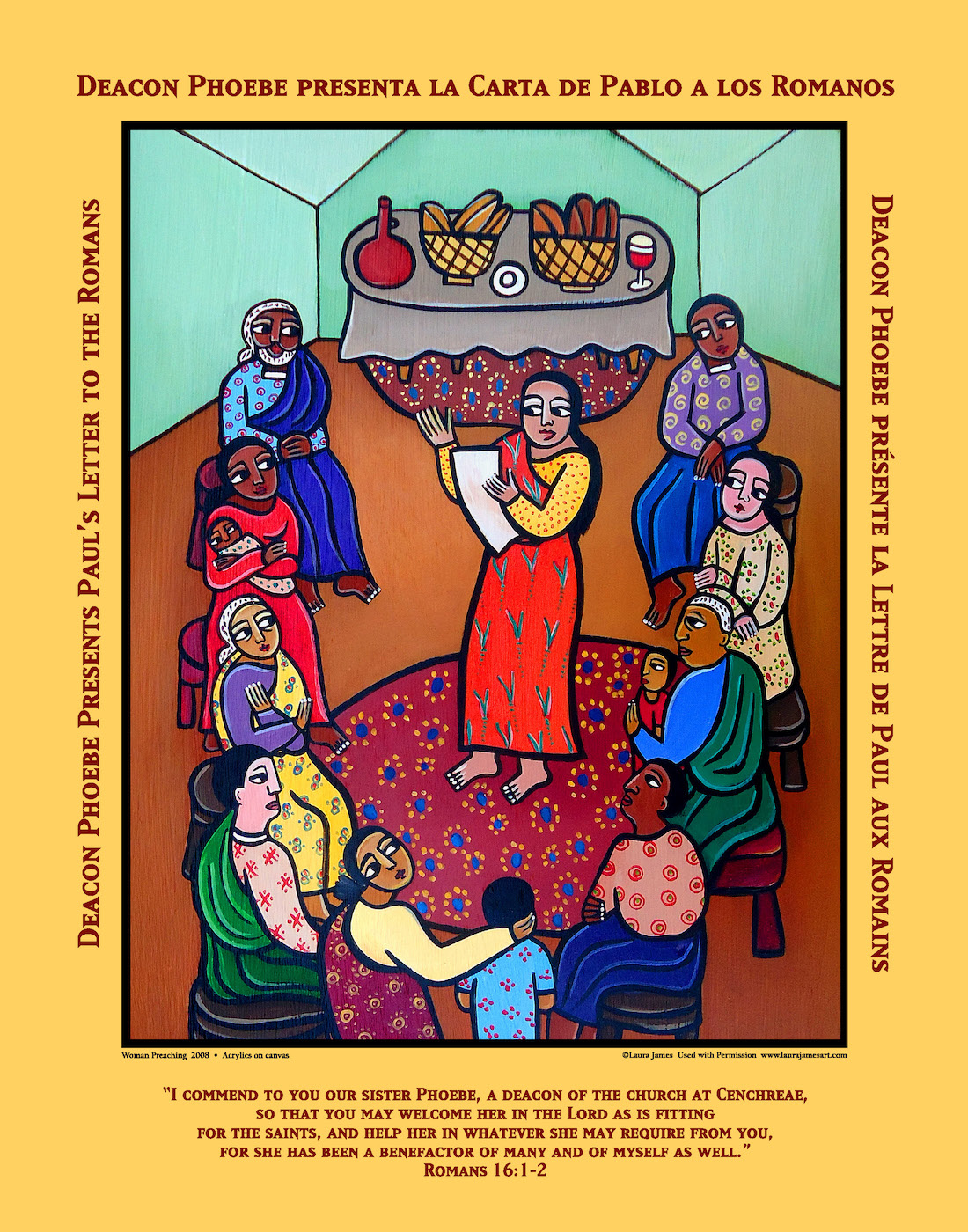Phoebe Poster
$29.00
11″ x 14″ Poster: “Deacon Phoebe Presents Paul’s Letter to the Romans”
Original Art: Woman Preaching by Laura James, Acrylics on canvas, 2008.
Poster: Design, Andrew Marino, 2016. Concept and Description, Rita L. Houlihan.
When I first saw Laura James’, “Woman Preaching”, in 2016 I knew the central figure was Phoebe, Diakonos of Cenchrae (Rom 16: 1-2). With Laura’s permission, Andrew Marino and I created this poster – “Deacon Phoebe Presents Paul’s Letter to the Romans”. It is a tribute to Phoebe, to those courageous early Christians, to the women and men – following in Phoebe’s footsteps, ministering in their communities, and to all who use whatever social power they have for good.
Paul introduces Phoebe to the 1st c. community in Rome as, “… our sister Phoebe, a minister [diakonos] of Cenchrae”(Rom 16:1-2). He describes himself as a diakonos who brings “… to the gentiles the news of the boundless riches of Christ” (Eph 3:7-9). As noted above, he uses the same Greek word, diakonos, for Phoebe, not a feminized version.
In her reflection on St. Phoebe1, Carolyn Osiek, RSCJ explains that, diakonos, “… carried connotations of both service and agency or representation—“minister” is good [as a translation], because it connotes both service and authority at the same time.” Unfortunately, the Roman Catholic Lectionary excludes Romans 16:1-2 from any readings, so most Catholics never hear of Phoebe. As Dr. Osiek commented, it is ironic, “… that the only person in the New Testament who by name is called a deacon of a local church– is a woman.”
Paul further identifies Phoebe as “… prostatis to many, including himself.” Sometimes, prostatis is translated as “assistant”. However, Dr. Osiek cautions, “She is not Paul’s assistant, but his benefactor or patron.” As a patron, Phoebe most likely provided hospitality and social connections for “… other Christians coming to Corinth, including Paul”, and is “… the probable reader and interpreter of his letter when she gets to Rome and delivers it.”
Professor Michael Peppard also examined in detail, both the text and the 1st c. social context of the Letter to the Romans. He offers this powerful conclusion, “… in addition to being a diakonos, a prostatis, and the courier of the most important theological text in Christian history, Phoebe may also have been its first authorized interpreter.”2
Dr. Osiek ends her reflection urging us to take St. Phoebe as a role model: “Phoebe was a woman who used her social status and power for the good of others and for the spread of the Gospel. We remember her, even though she was thought not important enough—or perhaps too important—to be included in the lectionary. Perhaps we could reflect on how we use whatever social power we have, to influence, to provide resources, to call out injustice, to come to the aid of the needy, to further the proclamation of the Good News. If we do that, Phoebe will be proud to have us as her successors.”
References:
1 Reflection on St. Phoebe, September 3, 2021, Carolyn Osiek, RSCJ https://www.catholicwomenpreach.org/preaching/09032021
2 “Household Names”, M. Peppard, Commonweal, April 23, 2018 https://www.commonwealmagazine.org/household-names
Carolyn Osiek, RSCJ, was professor of New Testament at Catholic Theological Union at Chicago for 26 years, and is professor emerita from Brite Divinity School at Texas Christian University. She retired in 2009 to become the archivist of the Society of the Sacred Heart, United States-Canada Province. She is the author or editor of many books and articles on the New Testament and Early Church and on the early history of the Society of the Sacred Heart.
Michael Peppard is a Professor of Theology at Fordham University with interests in the social, political, artistic, and ritual context of the New Testament, Early Christian Studies, Religion and Public Life. Dr. Peppard is the author of two award-winning books and a contributor to Commonweal, The New York Times, The Washington Post, CNN, and PBS.
